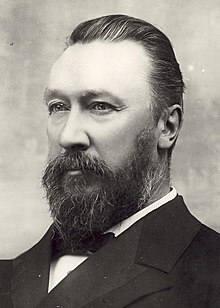
Back ويليام لين Arabic ويليام لين ARZ William Lyne German William Lyne French William Lyne Italian William Lyne Malay William Lyne Polish William Lyne Swedish
The Honourable Sir William Lyne | |
|---|---|
 | |
| Treasurer of Australia | |
| In office 30 July 1907 – 12 November 1908 | |
| Prime Minister | Alfred Deakin |
| Preceded by | John Forrest |
| Succeeded by | Andrew Fisher |
| Minister for Trade and Customs | |
| In office 5 July 1905 – 30 July 1907 | |
| Prime Minister | Alfred Deakin |
| Preceded by | Allan McLean |
| Succeeded by | Austin Chapman |
| In office 11 August 1903 – 27 April 1904 | |
| Prime Minister | Edmund Barton Alfred Deakin |
| Preceded by | Charles Kingston |
| Succeeded by | Andrew Fisher |
| Minister for Home Affairs | |
| In office 1 January 1901 – 11 August 1903 | |
| Prime Minister | Edmund Barton |
| Preceded by | New office |
| Succeeded by | John Forrest |
| Premier of New South Wales | |
| In office 14 September 1899 – 27 March 1901 | |
| Governor | Lord Beauchamp |
| Preceded by | George Reid |
| Succeeded by | John See |
| Member of the Australian Parliament for Hume | |
| In office 29 March 1901 – 13 May 1913 | |
| Preceded by | New division |
| Succeeded by | Robert Patten |
| Member of the New South Wales Parliament for Hume | |
| In office 29 November 1880 – 20 March 1901 | |
| Preceded by | George Day |
| Succeeded by | Gordon McLaurin |
| Personal details | |
| Born | 6 April 1844 Great Swanport, Van Diemen's Land, Australia |
| Died | 3 August 1913 (aged 69) Double Bay, New South Wales, Australia |
| Political party | Protectionist (before 1909) Independent (after 1909) |
| Spouses | Martha Shaw (m. 1870–1903)Sarah Olden (m. 1905) |
| Relations | Carmichael Lyne (brother) |
Sir William John Lyne KCMG (6 April 1844 – 3 August 1913) was an Australian politician who served as Premier of New South Wales from 1899 to 1901, and later as a federal cabinet minister under Edmund Barton and Alfred Deakin. He is best known as the subject of the so called "Hopetoun Blunder", unexpectedly being asked to serve as the first Prime Minister of Australia but proving unable to form a government.
Lyne was born in Van Diemen's Land, the son of a pastoral farmer. When he was 20, he and cousin took up a sheep station in North West Queensland. However, he moved back home after a few years and found work in local government. Lyne moved to New South Wales in 1875, buying a station near Albury and becoming prominent in community affairs. He was elected to the colonial Legislative Assembly in 1880, and first entered cabinet in 1885 under George Dibbs. He was a member of the Protectionist Party, and a major opponent of free-traders Henry Parkes and George Reid.
Lyne was elected leader of the Protectionists in 1895, and became Leader of the Opposition in New South Wales. He stood aside in 1898, but returned as leader the following year and became premier at the head of a coalition with the Labor Party. Lyne led an energetic and progressive government, instituting a number of major social reforms. He considered the draft constitution to be too unfavourable to New South Wales and supported the "no" vote at the 1898 and 1899 referendums.
In 1900, Lyne was asked by Lord Hopetoun (the incoming governor-general) to lead Australia's first national government. Hopetoun was relying on the precedent established at Canadian Confederation, where the premier of the largest colony became the prime minister of the new federation. However, Lyne had no support from leading federationists and was forced to relinquish the honour to Edmund Barton. Lyne became Minister for Home Affairs in Barton's government, and was later Minister for Trade and Customs and Treasurer under Alfred Deakin. Lyne opposed the formation of the new Commonwealth Liberal Party in 1909 and spent the rest of his career as a crossbencher, supporting Andrew Fisher's Labor government. He lost his seat at the 1913 election and died a few months later.
© MMXXIII Rich X Search. We shall prevail. All rights reserved. Rich X Search